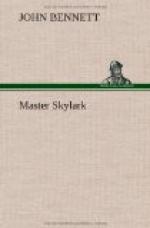Nick looked up in great surprise; and at that the master-player broke off suddenly and said no more, though such a strange light came creeping into his eyes that Nick, after meeting his fixed stare for a moment, asked uneasily if they would not better be going on.
Without a word the master-player started. Something had come into his head which seemed to more than fill his mind; for as he strode along he whistled under his breath and laughed softly to himself. Then again he snapped his fingers and took a dancing step or two across the road, and at last fell to talking aloud to himself, though Nick could not make out a single word he said, for it was in some foreign language.
“Nicholas,” he said suddenly, as they passed the winding lane that leads away to Kenilworth—“Nicholas, dost know any other songs like that?”
“Not just like that, sir,” answered Nick, not knowing what to make of his companion’s strange new mood; “but I know Master Will Shakspere’s ‘Then nightly sings the staring owl, tu-who, tu-whit, tu-who!’ and ’The ousel-cock so black of hue, with orange-tawny bill,’ and then, too, I know the throstle’s song that goes with it.”
“Why, to be sure—to be sure thou knowest old Nick Bottom’s song, for isn’t thy name Nick? Well met, both song and singer—well met, I say! Nay,” he said hastily, seeing Nick about to speak; “I do not care to hear thee talk. Sing me all thy songs. I am hungry as a wolf for songs. Why, Nicholas, I must have songs! Come, lift up that honeyed throat of thine and sing another song. Be not so backward; surely I love thee, Nick, and thou wilt sing all of thy songs for me.”
He laid his hand on Nick’s shoulder in his kindly way, and kept step with him like a bosom friend, so that Nick’s heart beat high with pride, and he sang all the songs he knew as they walked along.
Carew listened intently, and sometimes with a fierce eagerness that almost frightened the boy; and sometimes he frowned, and said under his breath, “Tut, tut, that will not do!” but oftener he laughed without a sound, nodding his head in time to the lilting tune, and seeming vastly pleased with Nick, the singing, and last, but not least, with himself.
And when Nick had ended the master-player had not a word to say, but for half a mile gnawed his mustache in nervous silence, and looked Nick all over with a long and earnest look.
Then suddenly he slapped his thigh, and tossed his head back boldly. “I’ll do it,” he said; “I’ll do it if I dance on air for it! I’ll have it out of Master Stubbes and canting Stratford town, or may I never thrive! My soul! it is the very thing. His eyes are like twin holidays, and he breathes the breath of spring. Nicholas, Nicholas Skylark,—Master Skylark,—why, it is a good name, in sooth, a very good name! I’ll do it—I will, upon my word, and on the remnant of mine honour!”
“Did ye speak to me, sir?” asked Nick, timidly.




